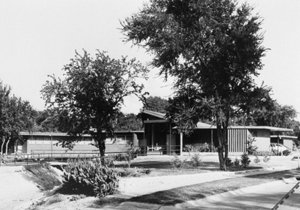The Garland Foundation for Development voted Tuesday, Nov. 16, to purchase a 1.68-acre property currently occupied by the Las Brisas Club. The property is located at 1002 Marion Drive in the Crest Ridge/Park Groves/Williams Estates area. It has been the subject of numerous complaints from neighbors and has had Code Compliance issues. The structure on the property is a 65-year-old clinic/hospital building. The facility, built by Dr. Robert Speegle, opened in 1954. It has traditionally been referred to as the Speegle Clinic. According to the Garland Landmark Society website, It housed an emergency room, delivery room, X-ray, surgery and lab facilities. It also contained 11 beds. The medical facility was Garland’s first alternative to Dallas hospitals.
The neighborhood is designated as a “Where the Heart Is” area. In addition, it is designated in the Parks Master Plan as an area that needs more open space.
The current owner’s asking price was $1.375 million. The city’s final offer was $1.275 million. The Garland Foundation for Development is scheduled to close on the property in January. The owner has been given until Jan. 20, 2022, to relocate the tenants. Shortly after that, the structure will be demolished. The Office of Neighborhood Vitality will then begin discussions with residents about future use of the property.
Council Member Robert J. Smith posted on his blog that he hopes the property will be utilized as a park.
What is the Garland Foundation for Development?
The Garland Foundation for Development is a local government corporation that was created in 2010 under the Texas Non-Profit Corporation Act. Local government corporations may be used to fund and/or manage transportation, water and sewer infrastructure, economic development ventures, and other projects that benefit the public. Foundations are common in Texas cities that do not have the ability to create an Economic Development Corporation (EDC). EDCs, commonly referred to as 4(b) corporations, are funded by a 1% optional 4(b) sales tax that can be used for various economic development activities. Garland’s 1% optional sales tax goes to fund DART for regional transportation. State law allows cities to form Foundations to perform many of the same functions of 4(b) corporations but have no taxing authority.
The Garland Foundation for Development was initially created to assist with downtown revitalization, in particular, the area around Fifth Street Crossing. Like an affiliate or subsidiary of a private corporation, the Foundation has been used to control risks and liabilities that could otherwise fall on the City and taxpayers. The Foundation has also been used to acquire property where it was believed that buying in the City’s name would have resulted in paying a higher price.
The Foundation’s board of directors consists of the nine members of the City Council, as allowed by law. The Foundation is subject to the same transparency requirements that are imposed on the City such as open meeting and open record requests.
Photo from Garland Landmark Society website.


